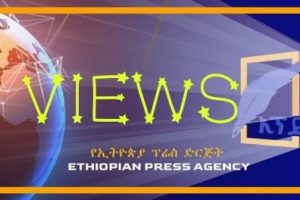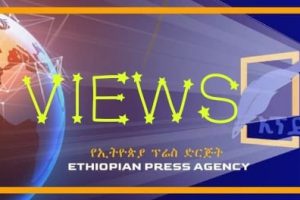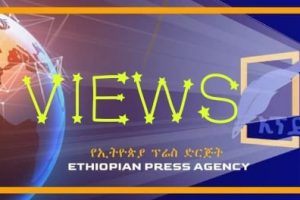Ethiopia is at crossroads right now due to many playing actors from outside and inside the country. Sometimes the outside and inside coordinate highly and it feels as if it is one and the same force to dismantle the country. People say that things are happening too fast and too often in the context of ruined nations like Somalia, Yemen, Libya, Soriya, Iraq, and Afghanistan.
One can argue that things are happening at random. Others may say, no, there is no way that these countries have fallen like that randomly. It is done by design. It might be sufficient to know that all these nations have one thing in common, that is, the same kind of religion. And in the past few decades, the world was busy talking about the kind of extremists or terrorists with most of them having a background from this religion. And there was a focus on fighting terrorism in the world.
However, Ethiopia is not a Muslim nation, though a good portion of its population is Muslim as compared to the mentioned countries above. Why is Ethiopia perceived like it is on the verge of turmoil? Why are the so-called great nations correlating Ethiopia with such countries? Is there a piece of strong evidence to group Ethiopia in the same box? Unless there is a design element here, there is no similar thing between Ethiopia and these countries. One cannot say that with certainty. Of course, there are patterns of events that we can say that Ethiopia is at a crossroads both internal and external. In this piece, only the internal situation is presented. The external factor is deferred for another publication.
The tension between federalists for dominating the country
Since the fall of the Derg communist government, Ethiopia has been led by a coalition of ethnic-based parties under one party until 2018. One of the Ethnic based parties from almost 6 percent of the population managed to hold the dominance for more than two decades. It was unacceptable to continue like that for the majority of the country. Many people stand to fight the injustice and the abuse of human rights.
The fight had two dimensions: external and internal. External, outside of the country, from the diaspora community all over the world. Internal, within the country, from opposition parties, and even within the ruling party. All these come together to crush the dominance of that ethnic-based party. Then this ethnic base party left the central power. Now we call it the old boss in the coalition. That defined the coming of the age of reform in the country.
At first, it was a huge relief for many. Those forces categorized as enemies of the state were welcomed to their home country. Everyone had huge expectations. It was high time. Many were too optimistic! Through time, things change. Motives of many individuals, groups of people, and parties start to surface. But one thing came out strong. The old coalition force led by one of the ethnic-based parties started to dominate at every aspect of the country under one party, but this time with a different name. This created a huge rift between these ethnic-based parties. Even the one who used to dominate and rule the country left that coalition.
The rest of them came together under the same umbrella, the new party name dominated by another ethnic-based party. This time the ethnic-based party dominating the coalition claims to be the larger ethnic group in the country. It also covers the largest geographical area in the country compared to the rest. Most importantly the capital city of the country that contains most of the economic activity of the country is within its region. Thus, it has leverage over many of the things in the country. This is the center of everything in the country now. The new ethnic-based boss in the coalition is the reality now. That is it.
The tension between the Old and the New boss.
In the past two years, one thing was highly visible. The tension between the old and the new bosses in the ethnic-based party ruling systems came out to the surface. The old boss wanted to come back to power. It started to design many things. One of the strategies was to discredit what the new boss did in almost every aspect of governing through its media, actually via the digital front and media.
The other strategy was putting into question the legitimacy of the governing boss when the election was postponed due to the COVID-disruption. The old boss held an election against some of the rules in the constitution that was prepared by itself many years ago. Of course, it also used another rule in the constitution to do that: article 39. This article grants all peoples of Ethiopia the right to self-determination without any ambiguity. It seems this article is the source of all problems in the country right now.
The third strategy the old boss used is to trigger war and unrest in the country to come to power. Remember, the whole country was under this boss. Everything in this country, the people, the finance, business, the infrastructure, organizations, government systems within the country and at the internal stage, etc. were directly and indirectly under the control of this old boss. It had the leverage of doing whatever it wanted to do. The tension grew and it led to an all-out war. The old boss lost the war. Now the Old boss party is designated as a terrorist party.
The tension between the ethnic federalists and the unity forces
As explained above, the country has been led by a coalition of ethnic-based parties with one of the ethnic tribes dominating the coalition. This trend of governing has huge opposition from those who wanted a government system that did not base itself on the ethnic-focused party system. Anyone in this kind of line of thought is categorized as a unifying force. Those ethnic federalists use ethnic sentiment to hold on to power. They claim that they are the messiah of their ethnic group they belong to. In reality, they are not. Let alone for a group of people, if one stands for the right of a single individual, it is not a bad idea at all.
To stand for the right of people, if they are undermined or underrepresented or even abused by others, is a noble act. But the truth of the matter when they fight for that ethnic group, they also grossly abuse the rights of many people who are from other ethnic groups living within a region where one ethnic group dominates. To explain this more, anyone who is living in a region or city that is dominated by an ethnic group other than its own ethnic root is exposed to abuse and mishandling by default. He or she will be considered as “mete”- the one who comes from another place. The question is, how many are “mete” in Ethiopia? It could be tens of millions who are living away from the place where their original ethnic root lives.
The unity forces think about how Ethiopians are intermingled and choose party systems other than ethnic federalists. They also propose some kind of federalism but not necessarily an ethnic-based party coalition government system. They think that party systems that can have members and leaders from any ethnic group are the best model for a country with more than 85 ethnic groups.
They fundamentally disagree with the ethnic base system since it will create unfairness by default. They wanted to abolish the ethnic-based political system and government system. They argue that if one is from that ethnic which is dominating, he/she can benefit, otherwise that person is a second or third citizen in his/her own country. But the ethnic federalists defend that is not what is happening.
They argue differently and they see the unity forces as a threatening force to their ethnic group’s existence. Since they think that the unity forces will/might undermine the needs of their ethnic group by giving the misdoing of the past unity forces like the DERG government. This created a huge tension between these two forces. It is still one of the main causes of conflict. Even the parties competing in the next election are categorized in one of the two camps.
The tension due to the third dimension – a party system across ethnic groups.
There is another approach that is coming out from the tension described above. This is one claim to recognize the ethnic group administration systems as they are now but want to build one party which functions across all ethnic groups. It tries to include even those people who are marginalized since they do not belong to this or that ethnic group. In a way building a country-wide functioning party system. The prime minister is believed to be in this group.
This third dimension is in the process of realization. It is fighting with the above two forces: the ethnic federalists and unity forces. It tries to build on the middle ground. But it has two enemies, from the left and right sides. It tries to walk the thin line. Sometimes it will be perceived as the unity force and ethnic federalists want to crash it. At another, it lines with the ethnic federalists and it experiences fierce battle from the unity forces. Even at times, it will also equally be heated by the two groups. Making it to be the third dimension. Making the matter worse, this third dimension exists within the two. Hence the tension exists.
The one who wins defines the country.
Among these three competitive groups, the one who comes out winning will define the course of the country. According to the winner of these tensions, the country’s fate will be decided. If the ethnic federalists win the country may face disintegration into many small countries like the old soviet union or Yugoslavia. If the unity forces win, we may see further fight and wrestling from many ethnic groups who will demand more stake in the country. If the third dimension wins then a mild rift may happen but in the long run, things may come to calm down. In any case, the country is at crossroads internally.
BY WENFIT TERARA
The Ethiopian Herald May 13/2021





